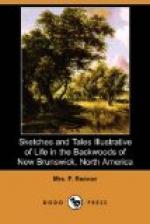you with its very appearance, but those would soon
change their opinion if they saw a pile of yellow birch
and rock maple laid right “fore and aft”
across the bright fire-dogs, the hearth swept up,
and the chips beneath fanned with the broom, they would
then see the union of light and heat in perfection.
In one way it is preferable to coals, that is, while
making on the fire you might if you chose wear white
kid gloves without danger of soiling them. Another
comfort to the settler in the back woods is, that every
stick you burn makes one less on the land. Stoves,
both for cooking and warming the houses, have long
been used in the United States, and are gradually
coming into common use in New Brunswick. In the
cities they are generally used, where fuel is expensive,
as they require less fuel, and give more heat than
open “fire-places;” but the older inhabitants
can hardly be reconciled to them; they prefer the
rude old hearth stone, with its bright light, to the
dark stove. I remember once spending the evening
at a house where the younger part of the family, to
be fashionable, had got a new stove placed in the
fire-place of “’tother room,”
which means, what in Scotland is termed “ben”
the house, and in England “the parlour.”
This was the first evening of its being put in operation.
I observed the old gentleman (a first-rate specimen
of a blue nose) looked very uncomfortable and fidgetty.
For a time he sat twirling his thumbs in silence,
when suddenly a thought seemed to strike him:
he left the room, and shortly after the draught-hole
of the stove grew dark, and a cloud of smoke burst
forth from it. The old gentleman came in, declaring
he was almost suffocated, and that it was “all
owing to that nasty ugly Yankee critter,”
the stove. He instantly had it taken down, and
was soon gazing most comfortably on a glorious pile
of burning wood, laid on by himself, with the most
scientific regard to the laws of levity, concavity,
and contiguity requisite in fire-making; and
by the twinkle of his eye I knew that he was enjoying
the ruse he had employed to get rid of the stove,
for he had quietly stopped the flue. For the
mere convenience of the thing, I think a stove is
decidedly preferable. In this country, where people
are generally their own cooks as well as everything
else, they learn to know how the most and the best
work can be done with the least time and trouble.
With the stove there is not that roasting of the face
and hands, nor confused jumble of pots and pans, inseparable
from a kitchen fire; but upon the neat little polished
thing, upon which there is nothing to be seen but a
few bright covers, you can have the constituents of
a New Brunswick breakfast, “cod-fish and
taters,” for twice laid, fried ham, hot
rolls, and pancakes, all prepared while the tea kettle
is boiling, and experience whilst arranging them no
more heat than on a winter morning, is quite agreeable.
In the furniture of these back-wood dwellings there




